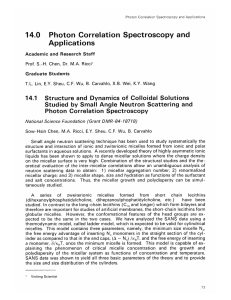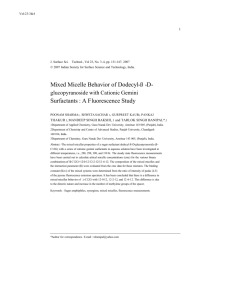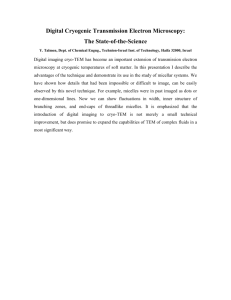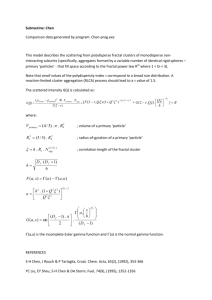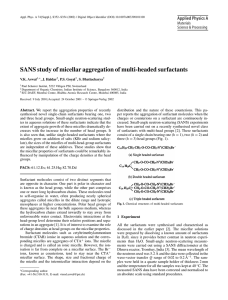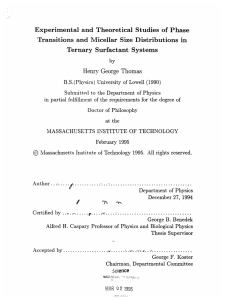Photon Correlation Spectroscopy and 14.0 Applications 14.1
advertisement
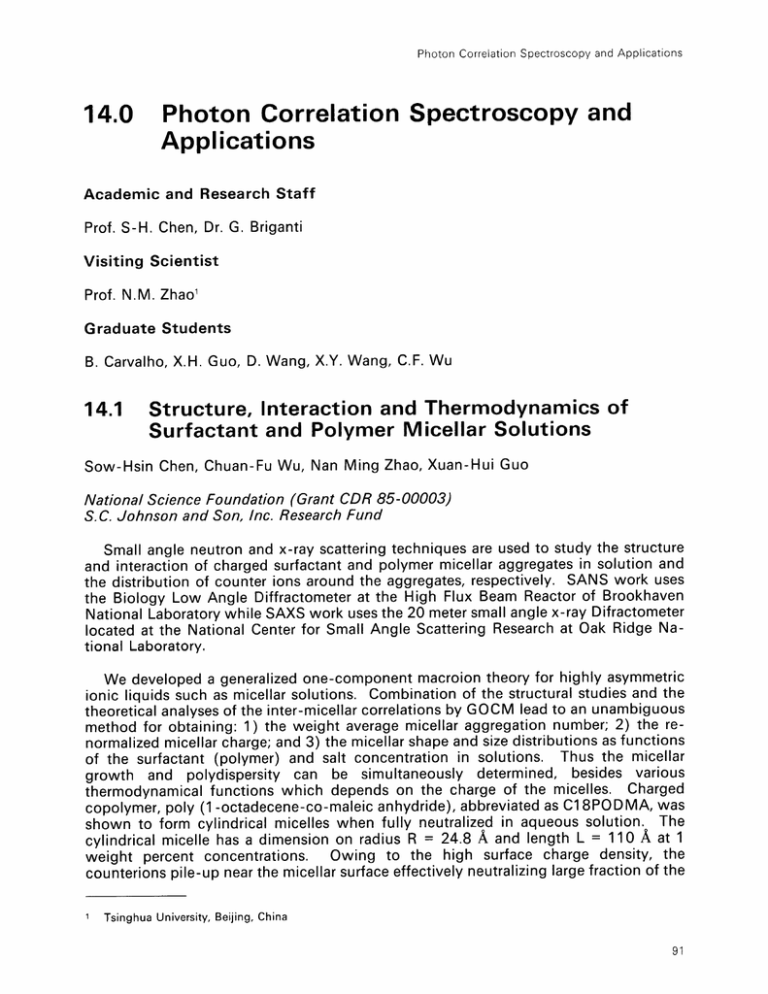
Photon Correlation Spectroscopy and Applications 14.0 Photon Correlation Spectroscopy and Applications Academic and Research Staff Prof. S-H. Chen, Dr. G. Briganti Visiting Scientist Prof. N.M. Zhaol Graduate Students B. Carvalho, X.H. Guo, D. Wang, X.Y. Wang, C.F. Wu 14.1 Structure, Interaction and Thermodynamics of Surfactant and Polymer Micellar Solutions Sow-Hsin Chen, Chuan-Fu Wu, Nan Ming Zhao, Xuan-Hui Guo National Science Foundation (Grant CDR 85-00003) S.C. Johnson and Son, Inc. Research Fund Small angle neutron and x-ray scattering techniques are used to study the structure and interaction of charged surfactant and polymer micellar aggregates in solution and the distribution of counter ions around the aggregates, respectively. SANS work uses the Biology Low Angle Diffractometer at the High Flux Beam Reactor of Brookhaven National Laboratory while SAXS work uses the 20 meter small angle x-ray Difractometer located at the National Center for Small Angle Scattering Research at Oak Ridge National Laboratory. We developed a generalized one-component macroion theory for highly asymmetric ionic liquids such as micellar solutions. Combination of the structural studies and the theoretical analyses of the inter-micellar correlations by GOCM lead to an unambiguous method for obtaining: 1) the weight average micellar aggregation number; 2) the renormalized micellar charge; and 3) the micellar shape and size distributions as functions of the surfactant (polymer) and salt concentration in solutions. Thus the micellar growth and polydispersity can be simultaneously determined, besides various thermodynamical functions which depends on the charge of the micelles. Charged copolymer, poly (1 -octadecene-co-maleic anhydride), abbreviated as C1 8PODMA, was shown to form cylindrical micelles when fully neutralized in aqueous solution. The cylindrical micelle has a dimension on radius R = 24.8 A and length L = 110 A at 1 weight percent concentrations. Owing to the high surface charge density, the counterions pile-up near the micellar surface effectively neutralizing large fraction of the 1 Tsinghua University, Beijing, China Photon Correlation Spectroscopy and Applications charge. We have performed SAXS measurement using C+ as counterions. We were able to, for the first time, directly verify the prediction of the Poisson-Boltzman equation with regard to the counterion distribution. 14.2 Hydrophobicity of the Solvent and Phase Transition in Micellar and Mixed Micellar Solutions National Science Foundation (Grant DMR 84-18718) National Science Foundation (Grant INT 83-13354) Exxon Research Fund Sow-Hsin Chen, Giussepe Briganti, Bruce Carvalho, Dan Wang A series of zwitterionic micelles formed from short chain lecithins (dihexanoylphosphatidylcholine, diheptanoly PC and dioctanoyl PC, etc.) in aqueous solutions have been studied by SANS and by photon correlation spectroscopy (PCS). We have analyzed SANS data using a thermodynamic model, called the ladder model, which is expected to be a good model for rod-like micelles. This model contains three basic parameters, namely, the aggregation number of the minimum size micelle, No; the free energy gain of forming the minimum size micelle, A; and the free energy gain of inserting an additional monomer into a micelle of the minimum size or larger, 3. This model is capable of explaining the phenomenon of critical micelle concentration (CMC) and the growth and polydispersity of micelle as the surfactant concentration is increased or salt is added to the solution. SANS data was shown to yield all three parameters of the theory, i.e., No , K = exp [(A - Nob)/kBT] and XB = exp[/kBT], besides the structural parameters such as the radius of the cylindrical micelle. It is known that pure diC 8 PC solution show liquid-liquid phase separation at room temperature with an upper consolute temperature occuring at T, = 45°C in H2 0 and at To = 65 0 C in D2 0. We have found that an addition of certain amount of urea in the aqueous solution dramatically lowers the consolute temperatures in both H2 0 and D20. Urea is a well-known protein denaturant which functions by weakening the hydrophobicity of water. We have shown that the phase separation phenomena in in surfacant solutions can be a very sensitive tool for studying the hyrdophobicity of water. Another method for changing the phase separation temperatures (or sometimes called cloud points) of a surfactant solution is the addition of salt. We found, however, that a particular class of salts, for example ionic surfactants such as SDS and AOT, is particularly effective in lowering the cloud points. The effect is connected to the formation of mixed micelles in solution. The combined techniques of SANS and PCS are used to study the thermodynamics and the dynamic concentration fluctuation of the surfactant solution near its phase separation temperature. Hydrophobicity of the solvent enters through parameters such as K and XB of the ladder model. Publications Brakto, D., E.Y. Sheu, and S-H. Chen, "Analysis of Intermicellar Structure Factors with the Mean Spherical and Hypernetted-Chain Approximations," Phys. Rev. A 35:4359 (1987). 92 RLE Progress Report Number 130 Photon Correlation Spectroscopy and Applications Chen, S-H., and T.L. Lin, "Colloidal Solutions." In Methods of Experimental Physics, Vol. 23, Part B Neutron Scattering, eds. D.L. Price and K. Skold, 489-543. New York: Academic Press, 1987. Chen, S-H., T.L. Lin, and C.F. Wu, "SANS Study of Structure, Growth and A Ladder Model Polydispersity of Short-Chain Lecithin Micellar Systems. D. langevin, and N. Analysis." In Physics of Amphiphilic Layers, eds. O.J. Meunier, Boccara, 242-252. New York: Springer-Verlag, 1987. Chen, S-H., and E.Y. Sheu, "Analysis of SANS Data from Strongly Interacting Polydispere Ionic Micellar Solutions," 10th Discussion Conference on "Small Angle Scattering and Related Methods," Prague, Czechoslovakia, July 13-16, 1987. To appear in Makromolekuare Chemie (1988). Lin, T.L., S-H. Chen, N.E. Gabriel, and M.F. Roberts, "SANS Techniques Applied to the Study of Polydisperse Rod-Like Diheptanoyl PC Micelles," J. Phys. Chem 91:406 (1987). Lin, T.L., S-H. Chen, and M.F. Roberts, "Thermodynamic Analyses of the Structure and Growth of Asymmetric Linear Short-Chain Lecithin Micelles Based on SANS Data," J. Am. Chem. Soc. 109:2321 (1987). Sheu, E.Y., and S-H. Chen, "Thermodynamic Analysis of Polydispersity in Ionic Micellar Systems and its Effect on SANS Data Treatment," to appear in J. Phys. Chem (1988). Sheu, E.Y., S-H. Chen, and J.S. Huang, "Structure and Growth of AOT Micelles in Aqueous Solutions," J. Phys. Chem 91:3306 (1987). Sheu, E.Y., S-H. Chen, and J.S. Huang, "Structure, Interaction, and Growth of Sodium Dodecyl-o-xylencanlfonate Micelles in Aqueous Solutions," J. Phys. Chem. 91:1535 (1987). Wu, C.F., and S-H. Chen, "SANS Studies of Concentrated Protein Solutions: Determination of the Charge, Hydration and H/D Exchange in Cytochrome D.," J. Chem. Phys. 87:6199 (1987). 14.3 Basic Studies of Laser-Cell Interactions Wan Yuan Industry, Inc., People's Republic of China Sow-Hsin Chen, Xui-Bin Wei, Xue-Yuan Wang The aim of this project has been to understand the various chemical processes which occur when a laser radiation of a certain wave length interacts with blood cells in the presence of a hematoporphyrin. An intrument consisting of a copper vapor laser coupled to an optical fiber/chemical injector catheter for the treatment of occluded arteries Photon Correlation Spectroscopy and Applications has been constructed and tested. The combined application of three steps: the preirradiation injection of HPD II, a brief copper laser irradiation (at 578 nm), and an enzyme urokinase infusion after the irradiation has been shown to produce the striking effect of liquifaction and resolution of a thrombus. Due to the low imput laser power and short period of irradiation, a histological examination of the arteries after the treatment showed no apparent damage of the arterial wall. Publication Wei, X.B., X.Y. Wang, and S-H. Chen, "A Copper Vapor Laser and Optical Fiber Catheter System for Liquifaction and Removal of Thrombus in Occluded Arteries," preprint, "Method and Apparatus for Laser Angiosurgery." Patent application pending. 94 RLE Progress Report Number 130
